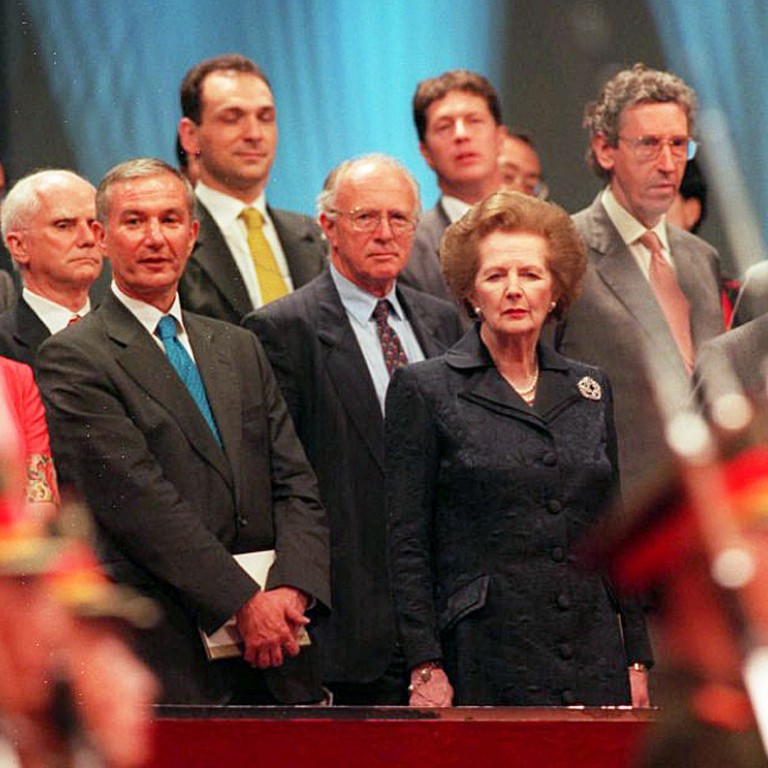
Britain made 1984 vow to Hong Kong on Sino-British joint declaration, declassified documents show
Former British PM told top city officials London would confront Beijing over any post-handover breaches of Joint Declaration, documents show
Margaret Thatcher assured Hong Kong's political elite during her visit to the city in December 1984 that Britain would not hesitate to raise any breach of the Sino-British Joint Declaration with Beijing after 1997.
The pledge was stated in the notes prepared by the Foreign and Commonwealth Office (FCO) for the then prime minister's informal conversations with members of the Executive Council and the Legislative Council on December 20, 1984.
Britain's assurance came to light in files recently declassified from the National Archives in London.
The closed-door meeting was held a day after the joint declaration was signed by her and then Chinese premier Zhao Ziyang in Beijing.
Thatcher was reminded in the "points to make" drafted by the FCO to tell Exco and Legco members that there was good reason for thinking Beijing would observe the agreement.
"Observance is in China's interests for economic reasons and for cause of reunification," the notes said.
"Britain has the right to raise any breaches with China after 1997. We would not hesitate to do so."
According to a declassified record of a meeting between Zhao and Thatcher on December 19, 1984, Zhao said it was a tradition of the Chinese nation to act in good faith.
"Zhao said China always lived up to her international commitments. The agreement reached on Hong Kong was such a good agreement that no one wanted to alter or change it," the record said.
READ MORE: Signing of joint declaration masked deep rift between Britain and China over Hong Kong's future
The high degree of autonomy Beijing pledged in the pact has been a bone of contention in Hong Kong in the wake of the release of the State Council's white paper in June, which stated that Beijing had "comprehensive jurisdiction" over Hong Kong.
The "Iron Lady" was also advised to send a similar message at her press conference in Hong Kong on December 21, 1984.
In the briefing notes for the press conference, the FCO suggested the "line to take" on the hypothetical question: "What will Britain do if [the] Chinese do not implement [the] agreement?" Thatcher was advised to reply that a "breach of a legally binding international agreement would be a most serious matter, in our eyes and no doubt in those of [the] international community as a whole".
"We would of course make the strongest possible representations to the Chinese government in order to seek a remedy."
But Thatcher gave a milder answer at the press conference, saying: "If by any chance any question rose under the agreement, naturally a signatory to it would raise the matter with the Chinese government."
Thatcher's visit to China in 1982 launched the Sino-British negotiations on Hong Kong's future. She died in April last year at the age of 87.
Professor Lau Siu-kai, vice-chairman of mainland think tank the Chinese Association of Hong Kong and Macau Studies, said Beijing's reputation was at stake if it failed to comply with the joint declaration. "Britain believes it has a moral duty to Hong Kong, but it doesn't mean it has the oversight of the situation of Hong Kong after 1997," Lau said.
Rifts between Britain and China over Hong Kong affairs emerged shortly after the signing of the joint declaration.
In July, British Deputy Prime Minister Nick Clegg told former chief secretary Anson Chan Fang On-sang and Democratic Party founding chairman Martin Lee Chu-ming that Britain would "mobilise the international community and pursue every legal and other avenue available" if China breached the declaration.
The row centres on Beijing's ban on a visit originally planned for this month by the House of Commons Foreign Affairs Committee, which is conducting an inquiry into the implementation of the joint declaration.

